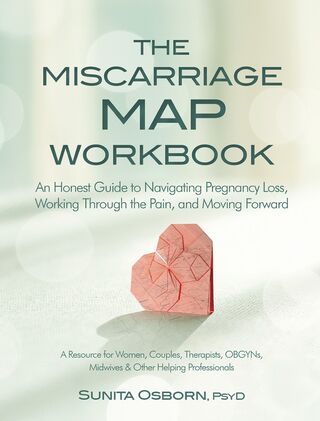Miscarriage
The Miscarriage Map Workbook
The Book Brigade talks to reproductive psychologist Sunita Osborn
Posted March 3, 2021 Reviewed by Gary Drevitch

Miscarriage can be a loss emotionally painful not just to an individual but to a couple and to a family. Although it is a common phenomenon, the lack of open discussion of loss can leave many struggling to navigate the emotional fallout.
First of all, what is the miscarriage map?
It is a straightforward roadmap to help women move through the trauma and grief of pregnancy loss. Informed by my own personal experience and clinical expertise, this book provides practical and meaningful tools geared towards helping readers to feel deeply understood, better equipped to handle life stressors, and more empowered to move forward in life after miscarriage. Additionally, the book offers notes and tips that therapists, OBGYNs, midwifes, and other helping professionals can use to tailor treatments for each individual patient they work with who has experienced pregnancy loss.
Why is the map important in understanding and dealing with the aftermath of miscarriage?
The map is important in understanding and dealing with the aftermath of miscarriage because it meets readers right at the beginning of their reproductive journey, as they are led through exercises that allow them to gain deeper and fuller awareness into their desires and stories around parenthood and experience of loss. While the path to life after pregnancy loss is not certainly a linear one, the map provides readers with guidance and direction as they move through processing, gaining awareness, and healing.
What are important features of the map? A unique feature of this book is that it is written by someone who has been on both sides of the therapeutic couch. I am a licensed psychologist trained to help individuals navigate the perils of trauma and grief, and I have become a client myself when I needed help in processing my own trauma and grief after I had two miscarriages. Thus, the content and exercises of this book are based both on research and clinical expertise, as well as from personal experience as I walked through each of these chapters and challenges myself. Other important features include that this book offers not only information, validation, and education, but it also provides readers and helping professionals with practical ideas, exercises, and skills.
What are common responses to miscarriage?
Common responses to miscarriage include feelings of guilt, shame, loneliness, sadness, anger, and confusion. Oftentimes, individuals can cycle through all of these emotions over the course of one day, perhaps even one hour, as they struggle to understand and process the reality of their experience.
Additionally, those who have experienced pregnancy loss often report having painful questions, such as, “Is there something wrong with me that I can’t have a baby and so many people around me can?” or “Will this ever happen for me?” Other common responses include difficulty concentrating, a lack of motivation, a desire to isolate self, and difficulties feeling connected with others. It is important to note that the range of responses can vary based on the unique contextual factors of the individual.
To what degree is the response to loss shared by both partners?
While research tells us that both the pregnant and non-pregnant partners are certainly impacted by pregnancy loss, their individual experience of the loss may differ based on cultural backgrounds,
personalities, and their unique ways of viewing the world. Therefore, while both partners will have their own emotional reactions to the loss, they may differ—and differ wildly.
For example, one partner may feel furious and betrayed by her body or the world, while another may just feel devastatingly numb. Moreover, gender role stereotypes play a role in shaping how we believe men versus women “should” react in the face of difficulty. Women are reinforced for expressing their emotions, while men are encouraged to hide their feelings and remain stoic in the face of tragedy. These differing styles can lead to a sense of disconnection with one’s partner; though it’s important to note that even while these reactions may appear different on the surface, each partner is likely grieving in their own unique way.
What happens in the case of pregnancy loss from donated sperm?
While there is still limited research into the specific experiences of those who have had pregnancy loss from donated sperm or other artificial reproductive techniques, the research that has been done and shared personal accounts suggest that there can be additional stressors to consider in this experience, including increased financial considerations, limited options (e.g., if there was a particular sperm donor the couple wanted to use and that sperm was no longer available), as well as considering the unique history of the individual and couple that have experienced the loss.
What do you find is the most poignant aspect of working with women or couples who’ve experienced a pregnancy loss?
One of the most poignant aspects of working with women or couples experiencing pregnancy loss is making space for the magnitude and the breadth of the losses they have experienced. When you experience a miscarriage, you lose not just the pregnancy but also lose the dreams, the hopes, and the wishes you had for this child. Additionally, you may be confronted by numerous other losses along the way, such as a loss of financial security, a loss of a “healthy” physical identity, loss of the “innocent, normal” experience of pregnancy, and the loss of membership in the hallowed parenthood club, just to name a few.
Is there one thing that is most helpful to people recovering from pregnancy loss?
While there is not one universal thing that can be helpful for all who are recovering from pregnancy loss, it can be incredibly helpful to be connected to social support and, specifically, the kind of support that is tailored to an individual’s needs. Some may benefit from practical support, such as a friend who can take them to doctors’ appointments or bring them food when they don’t feel up to it, while others may feel strengthened by emotional support. Some may benefit from the friend who doesn’t do anything but is just there offering compassion and empathy. It can be incredibly helpful to support and guide individuals in identifying the kind of support they need.
What does recovering from pregnancy loss entail?
We think of grief recovery as the process of being able to fully acknowledge, reflect, and process one’s loss. It means giving yourself permission to feel a full range of emotions, from sadness towards what has been lost to joy when reflecting on fond memories. Grief recovery means waking up one day and realizing that your ability to talk about your experience of pregnancy loss is normal and healthy. In this way, the loss does not erase itself from your history but rather is integrated into your story, sense of self, and future.
What are the hallmarks of recovery?
While recovery may include a decrease in certain experiences such as rumination and/or overwhelming sadness or anger and an increase in the capacity for day-to-day functioning, recovery is not limited to symptom reduction. Recovery includes an integration of your loss into your story, sense of self, and future so that you gain deepened insight into the effect of the loss and the unique meaning you have created from the experience. It is with this insight and meaning-making that you are able to start choosing how you want to move forward.
What is the most surprising thing about response to pregnancy loss you have discovered in your work?
One of the most surprising things that I have encountered is seeing the way in which the comparison trap (our tendency to compare ourselves to others and often comparing our internal experiences and pain to the external glimpses we get of others) can serve to diminish the significance and meaning of an individual’s loss.
Also referred to as the “suffering hierarchy,” I have heard women compare their suffering to the experience of others even within the pregnancy loss and infertility community (e.g., “Well, I’ve only had one miscarriage, but she’s had three after going through multiple cycles of IVF.”). This type of comparison can keep individuals stuck in their grief, as they do not allow themselves permission to feel the full extent of their loss.
If you had to limit yourself to one item, what one idea or insight would you like readers to get from this book?
Pregnancy loss is an inherently disempowering experience. It takes away our choices when it comes to when and how we want our family, our future, and even our bodies to be. Thus, it is so important to give yourself permission to take the time to consider how this loss has impacted you, to give yourself space to process what you are feeling, and to find ways to empower yourself to create choices where you can, whether that is explicitly giving yourself permission to feel everything you are feeling to deciding the next step in your fertility journey.
About THE AUTHOR SPEAKS: Selected authors, in their own words, reveal the story behind the story. Authors are featured thanks to promotional placement by their publishing houses.
To purchase this book, visit: The Miscarriage Map Workbook





